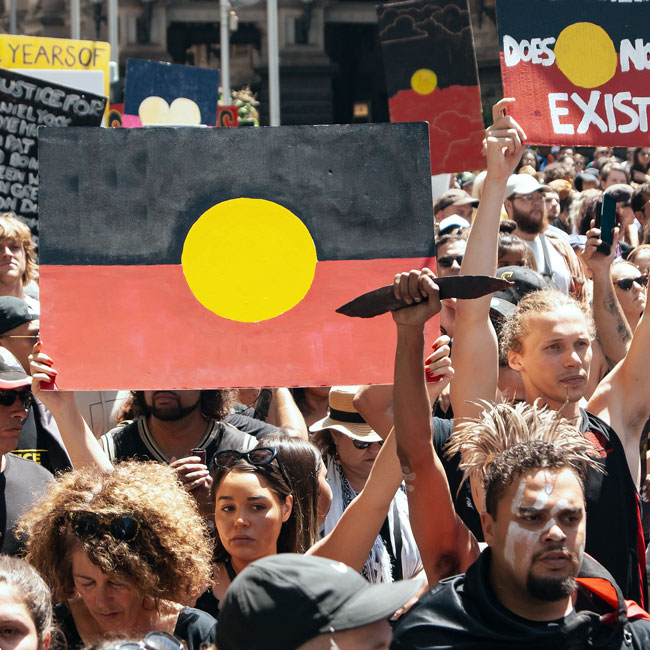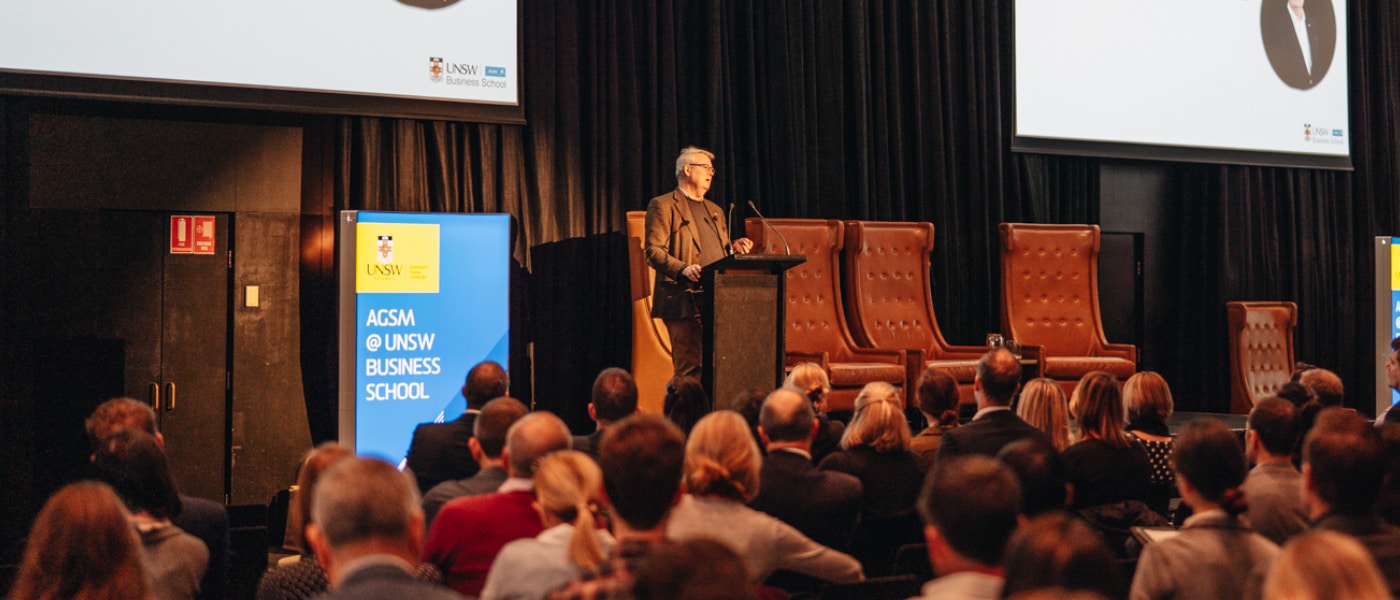
Sir Geoff Mulgan on what makes a good leader
Opinion + AnalysisBusiness + Leadership
BY The Ethics Centre 16 NOV 2022
Sir Geoff Mulgan has had a world of careers. Currently Professor of Collective Intelligence, Public Policy and Social Innovation at University College London, Mulgan discusses trust, power and what makes a good leader.
“There’s a risk in any relationship of power that it can amplify your vices as well as your virtues – vices of vindictiveness or meanness, of spirit or dishonesty. And I’m sure there’s some of that in me, probably because of my character faced by pressures and threats I’d be more likely just to run away and resign, rather than to become a sort of evil Adolf Hitler in the bunker type but you certainly see this in many other people.”
Geoff Mulgan has spent his entire career musing over the question: what makes a good leader? And not only that, but how you cultivate those skills and that mindset without becoming …a psychopath. This thinking prompted Geoff to write a book on this subject, in which he critiques the strong traditions within Christianity and Chinese philosophy. He explores the idea that what constitutes a good leader essentially depends on the ethics of the individual – that, if only you could find the right person for the right job everything would go swimmingly… through his vast research and experience, Geoff says this is completely wrong.
“We are creatures of our context. We are far more likely to be good leaders if there are constraints and pressures, if what we do is visible, if there are balancing forces and many people. Even apparently quite good people, if they can get away with things, will get away with those and they may start quite good. But five, ten, let alone 15 years later, if they’re still in power, they become evil monsters and again and again we see that at the global level.”
Are leaders scared of wisdom?
It’s in a leader’s interest to elicit a sense of awe and respect in their followers. They should be in possession of higher knowledge that can justify to those who work for them that they are worthy of that position. According to Geoff, that is why no leader can ever be completely transparent as they need to maintain this sense of mystery about their workings.
“As a leader I think you have to maintain an opacity, a sort of mystery about your knowledge and wisdom. You see it very clearly in how people talk about Putin or Modi or Xi. They wanted to project onto them this sort of genius, brilliant tactical, strategic genius, which we couldn’t understand. It’s sort of beyond comprehension, but we just sit back and admire it.“
And Geoff sees this behaviour amongst business leaders all the time – “the hagiographic magazine articles and books trying to cultivate an aura, a mysterious magical genius around their insights… which then suddenly collapses when the share price drops.”
Declining trust in institutions
When Geoff was working within the British government he said one of the biggest concerns internally was wavering trust in public institutions. As a result, he lead a large scale project under former UK Prime Minister Tony Blair asking the question: what could be learnt from how public institutions had lost and regained trust? He found the learnings for rebuilding trust were simple:
- Publicly acknowledge and apologise when something has gone wrong
- Articulate your moral purpose
- Perform your core function competently
The key positive that Geoff took away from this research was that: the problem of trust and trustworthiness is actually a fixable problem if you acknowledge it clearly and if you have the courage to really deal with it on these three key dimensions.
Is it possible to lead without getting your hands dirty?
“One of the weird things about leadership is you need a dual mind all the time of apparently opposite qualities – arrogance and humility, toughness and sensitivity, which need constantly replenishing and keeping in a balance… And if you drift too far in either direction, you won’t function very well.”
Geoff set up a young leadership training program in the UK, called “Uprising” and he explains the two dualities that he endeavoured to instil in the course which are:
- You have to be tough and have a thick skin. You’ll need to do things that are unpopular and unpleasant like firing people and closing things down and you need to be psychologically prepared to do that.
- On the flip side you also need to maintain your sensitivity, and not allow the aforementioned thick skin to destroy your ability to be kind and virtuous.
The second duality is: arrogance and humility
- Anyone becoming a leader needs to have a sense of arrogance, they need to believe that they are genuinely better than a million other people who could fill the role. Arrogance isn’t a bad thing, it’s a necessary thing to overcome setbacks, the personal attacks, the social media trolling and everything else that comes with being a public figure.
- But you also need to be humble. The humility to constantly learn and be open to new ideas.
In his experience, it is the young leaders who can manage to keep both of these sets of dualities in harmony who are the most successful.
The leaders of the future
We have a difficult few decades ahead of us, one that will be characterised by the accelerating climate crisis, widening inequality, austerity, and increasing inflation. Geoff believes that we will need to elevate the best people into positions of power if we are to emerge from the other side of this tumultuous time unscathed. His biggest fear is that, over the next few years the sorts of individuals who would make excellent leaders will shy away from the job because it’s too risky or too damaging to their private life, or just too difficult, and so we must persuade and elevate these individuals who possess that duality of arrogance and humility to put themselves forward and act.
“At the very heart of leadership is some sense of obligation and service to the whole community you are part of, realising almost everything you have has been given to you by others… Very little is created by yourself. And that gift requires a gift back.”
AUDIO: Listen to the full podcast discussion above
Sir Geoff Mulgan is Professor of Collective Intelligence, Public Policy & Social Innovation at University College London (UCL). He was CEO of Nesta, the UK’s innovation foundation from 2011-2019. From 1997-2004 Geoff had roles in UK government including director of the Government’s Strategy Unit and head of policy in the Prime Minister’s office. Geoff advises many governments, businesses, NGOs and foundations around the world. He has been a reporter on BBC TV and radio and was the founder/cofounder of many organisations, including Demos, Uprising, the Social Innovation Exchange and Action for Happiness. He has a PhD in telecommunications and has been visiting professor at LSE and Melbourne University, and senior visiting scholar at Harvard University.
Find out more about other conversations in the Leading with Purpose podcast. Delve into more articles and podcasts like this by signing up to our Professional Ethics Quarterly newsletter.
Ethics in your inbox.
Get the latest inspiration, intelligence, events & more.
By signing up you agree to our privacy policy
You might be interested in…
Opinion + Analysis
Business + Leadership, Politics + Human Rights
Should corporate Australia have a voice?
Opinion + Analysis
Business + Leadership
How can Financial Advisers rebuild trust?
Opinion + Analysis
Business + Leadership
How cost cutting can come back to bite you
Opinion + Analysis
Business + Leadership, Relationships




